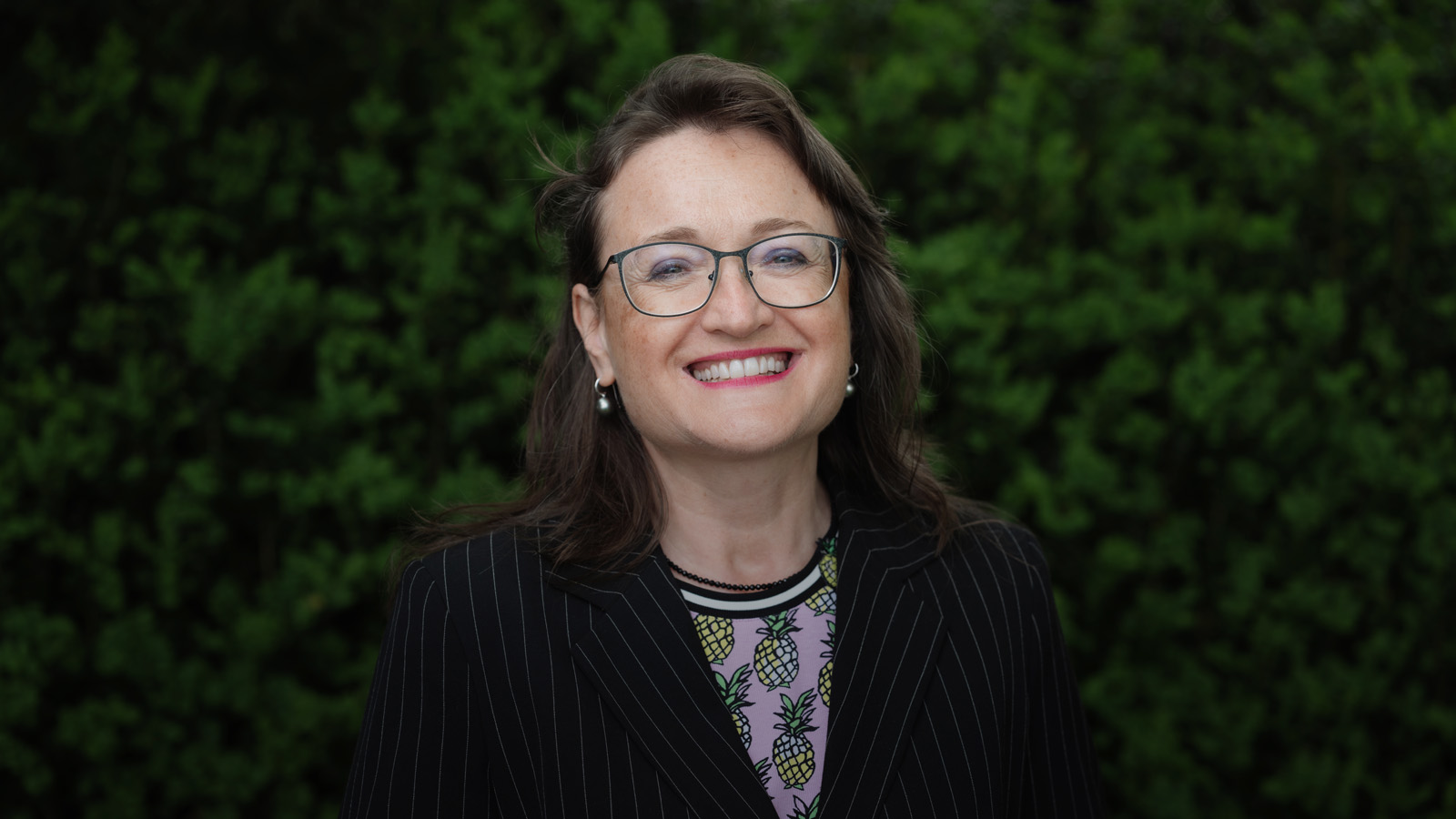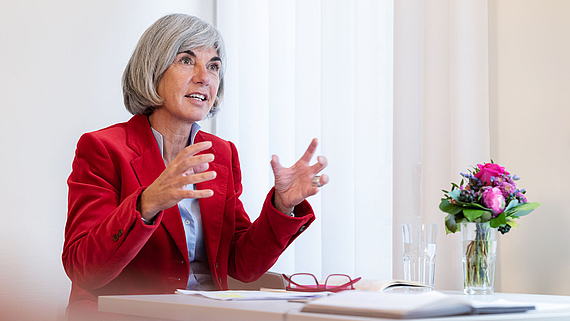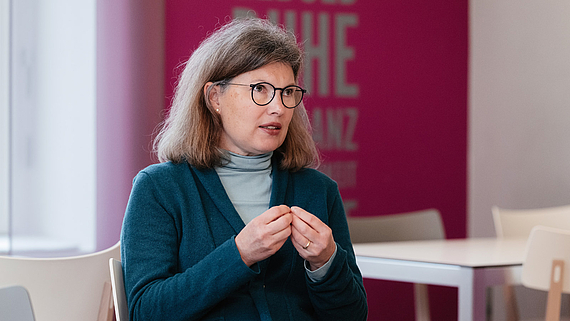Psychiatry exclusively for women
“We see women in all their individual lived realities”
Klinik Meissenberg is the only psychiatric hospital in Switzerland exclusively for women. Chief Physician Dr. med. Kamila Dudová-Nakazi talks about the benefits of a safe space for women with mental illnesses, the tailored range of therapy services on offer – and how Klinik Meissenberg also manages this organisationally.

You have been Chief Physician at Klinik Meissenberg since November 2024. Can you tell us something about your career and why you decided to specialise in women’s psychiatry?
Dr. med. Kamila Dudová-Nakazi: I am a specialist in psychiatry and psychotherapy and have been concerned with mental illnesses and the associated issues and effects on women for many years. I have worked in Germany and primarily in Switzerland at the University Hospital in Bern, where I completed my psychiatric and psychotherapeutic training. For almost 30 years, I have been working in this field and have been a specialist in psychiatry and psychotherapy for more than 20 years. Some of the places I have worked include Klinik Zugersee, where I held a senior position for several years, and later in my own practice for 15 years, specialising in women’s health. I also established and ran the psychiatric consultation service at Hirslanden AndreasKlinik Cham. I have been a lecturer in psychiatry and psychotherapy at the SHI Homoeopathic College in Zug for many years. And I have been involved at professional policy level for many years as a member of the board of the Medical Association of the Canton of Zug (AGZG). Switzerland and the canton of Zug are an adopted home for me and my family.
Why is it so important to consider mental illness in women separately?
We know that women experience mental health issues differently than men. For instance, women are much more likely to suffer from anxiety, depression and eating disorders. Women tend to have different symptoms to men, often in the context of the female life cycle. This is why an individual approach and specialised treatment services are needed ...
... Like a dedicated clinic for women?
Many of our patients have been through traumatic experiences, such as childhood abuse, domestic violence or bullying. They often feel safer in a specialised women’s clinic and can talk more openly about their problems. There are also many mental illnesses that progress differently in women than in men or that are influenced by hormonal changes. As a psychiatric clinic specialising exclusively in women’s health, we are experts in these specific issues and can address them in a targeted manner.
“Women experience mental health issues differently than men. This is why an individual approach and specialised treatment services are needed.”
Dr. med. Kamila Dudová-Nakazi
Klinik Meissenberg is one of the few psychiatric clinics in Europe exclusively for women. What services do you offer?
We offer a wide range of treatments involving close cooperation between patient care, medicine, psychology and specialised therapy. These include high-frequency psychotherapy, movement and art therapy, occupational therapy, various group therapies and sports programmes. In addition, we offer specialised therapy programmes for women with post-traumatic stress disorder, pain disorders, eating disorders, depression, obsessive-compulsive disorder and anxiety disorders. We also have a specialised therapy department for emotional regulation disorders at the clinic, which is based on Marsha Linehan’s DBT concept. Here, patients with borderline syndrome in particular are offered structured and evidence-based psychotherapy.
In addition to the wide range of psychotherapeutic treatments on offer, Klinik Meissenberg also utilises other treatment methods. What additional therapeutic approaches are available to your patients?
We offer a wide range of biological therapy methods. These include psychopharmacotherapy tailored to women, light therapy, biofeedback and brain stimulation therapy. At Klinik Meissenberg, we attach great importance to holistic and evidence-based treatment. We offer excellent cuisine, with a choice of four menus at lunchtime to cater for physical well-being. And last but by no means least, the idyllic location at the foot of the Zugerberg mountain, surrounded by nature and with stunning views over Lake Zug and the Alps, set in beautiful gardens. This closeness to nature is very beneficial for the healing process.

How does this holistic approach manifest itself in the treatment of patients?
In addition to psychological symptoms, we also consider physical factors such as metabolic disorders or hormonal changes, as during the menopause, which can also affect mental health, and focus on thorough diagnostics. Patients’ individual resources and coping strategies are valued and incorporated into the therapy. We are guided by scientifically-based treatment recommendations.
You work with patients who often have a complex life history. What special challenges does this pose?
Taking a patient’s individual life history into account is crucial. In our work, we encounter many patients with post-traumatic stress disorder or emotion regulation disorders. These are often directly related to early traumas. It is therefore important to consider the entire circumstances of women’s lives. And patients need rest, time and trust to be able to deal with these difficult issues.
What does that mean?
We analyse the situation carefully: What is the social environment like? Is there support from family or friends? The financial situation also plays a major role. We know that women worldwide are more likely to be affected by poverty than men. There are many reasons for this, such as a lack of education or career breaks due to raising children and family responsibilities. People who have been at home for a long time often find it difficult to return to work. Together with our patients, we look at the support network they need after discharge. Our social counselling service offers targeted help here.
So the causes of mental illness also manifest themselves in social role models?
Absolutely. When men fall ill, it is often the woman who keeps everything running smoothly. But when a mother of young children is mentally ill, things get complicated. The father is often working, and if there are no other support structures in place, the whole family system is thrown into crisis. In addition, women are more often exposed to multiple burdens, whether juggling family and career or caring for elderly relatives and relatives in need of care. We also know that marriage is a protective factor for men. This could not be proven for women, at least not in the studies. Good education, a robust social network, financial security and a safe environment are protective factors for both the physical and mental health of women.
How can affected women be supported in such situations?
It requires a network of professional care, social support and often pragmatic solutions in everyday life. Therapy is important, but if the patient goes home after the session and is overwhelmed by everyday life without any help, she will find it difficult to achieve stability. That’s why we look for solutions together with the patients: Are there relatives or friends who can help? What public or private support services are available, such as psychiatric respite care? How can family members be supported? Which self-help group can also be helpful?
Are there any special programmes or strategies that have proved particularly successful?
We attach great importance to individually tailored treatment. Each patient receives a therapy programme that is tailored to her personal physical and psychological needs. Our team consists of doctors, care professionals, psychological psychotherapists, behaviour-oriented therapists, social workers and other specialists who collaborate closely. We also offer timely support with daily routines following discharge.
“We attach great importance to individually tailored treatment. Each patient receives a therapy programme that is tailored to her personal physical and psychological needs.”
Dr. med. Kamila Dudová-Nakazi
Is this also supported organisationally?
Our tridimensional management model plays a central role here. In many clinics, medical, psychotherapeutic and caregiving areas are often separated, which can lead to information loss and less efficient treatment processes. The tridimensional model means that each patient is looked after by an interdisciplinary team made up of a doctor, a psychotherapist and a primary carer. These three areas work closely together and ensure that patients receive comprehensive care. This allows us to respond more quickly and specifically to the needs of patients.
Does the private department at Klinik Meissenberg also operate according to this principle?
The private department at Villa Paracelsus offers a particularly intensive and individually tailored range of therapies. Patients benefit from a calm, safe environment with enhanced treatment approaches, including additional group therapies and special psychotherapeutic approaches such as schema therapy. This setting is particularly suitable for women who require intensive support in a pleasant environment. In addition, detailed somatic diagnostic tests are performed where indicated. On the pharmacological side, phytotherapeutics, NADA ear acupuncture and aromatherapy are used in addition to evidence-based psychopharmacotherapy tailored to women. Regular massages also promote the relaxation process. Patients have the option of dance and movement therapy, art and expressive therapy, occupational therapy and access to an in-house fitness centre and sports facilities.
Meissenberg Privé
Patients with private and semi-private insurance enjoy exclusive additional benefits at our clinic, providing them with maximum comfort and optimal care. Our services are designed to promote recovery and well-being during and after treatment.
How do you see the future of women’s psychiatry?
Women’s psychiatry must continue to develop and adapt to new challenges. We now know much more about gender-specific differences in mental health than we did a couple of decades ago. This should be reflected in the treatment programmes. I would also like to see more specialised services – not only in inpatient facilities, but also in outpatient care. Women should receive the right support more easily and quickly.
Do you also prioritise these areas as Chief Physician?
Yes – with the expansion of our specialist women’s outpatient department, which is integrated into the clinic and headed by a specialist in psychiatry and psychotherapy. We have expanded it to enable both intensive pre-treatment prior to inpatient therapy and closer follow-up care. This is particularly important considering the shortage of skilled workers: By providing closely managed outpatient care to patients, we can in some cases shorten or even avoid inpatient stays. And closely managed outpatient follow-up treatment can reduce the likelihood of re-admission to clinic. This relieves pressure on the entire system.
What are your hopes for the future of Klinik Meissenberg?
I hope that Klinik Meissenberg will continue to play a leading role in women’s psychiatry and that we can further expand our specialised services. We need to look closely, listen attentively and take concerns and reservations seriously – only then can we ensure effective treatment. And, of course, I hope that women will continue to consciously choose Klinik Meissenberg. Because they know that here they will not only receive a diagnosis, but will also be seen and understood as individuals in their own unique life circumstances and receive tailored support.



